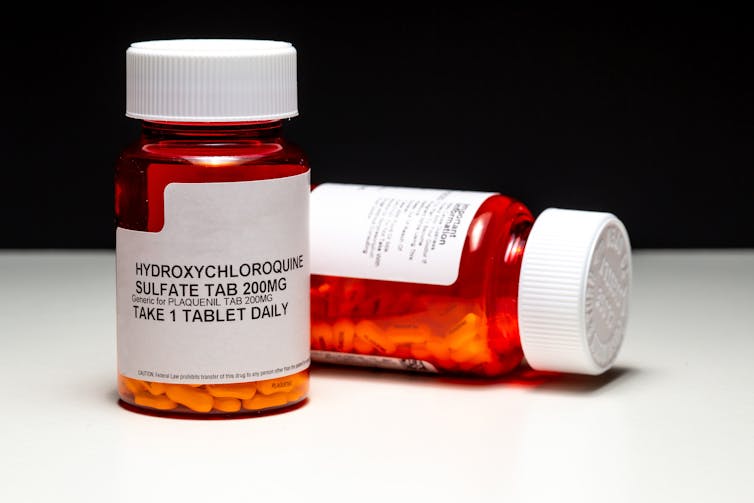
Parastou Donyai, University of Reading
There’s worrying news around the world of people self-medicating at home with the drugs chloroquine and hydroxychloroquine to treat COVID-19. There’s since been reports of chloroquine poisoning and even death after taking the drug. Scientists first reported chloroquine’s potential against coronaviruses after the SARS epidemic in 2003.
Part of the recent confusion seems to have followed US president Donald Trump’s announcement on Twitter that implied hydroxychloroquine and another drug (the antibiotic azithromycin) taken together could treat novel coronavirus. The US Food and Drug Administration released a statement in response, saying they’re still looking into whether chloroquine can treat people with mild to moderate symptoms of COVID-19. Neither of these drugs have been approved in the US to treat COVID-19. Tests are still being conducted elsewhere, including in China, to see whether they can help treat patients admitted to hospital with COVID-19.
Chloroquine has been around for more than 80 years. It was developed as an antimalarial drug but is now also used to treat conditions including rheumatoid arthritis and systemic and discoid lupus erythematosus (lupus). It was produced to provide another treatment option to quinine, an older antimalarial drug which came from the bark of cinchona trees.
Hydroxychloroquine, which has been around since 1955, is similar to chloroquine but less toxic. But it does have some side effects, including stomach problems and long-term problems for the eyes. Like chloroquine, hydroxychloroquine is used to treat rheumatoid arthritis and lupus, and is also used for managing sun allergies.
Chloroquine has been used to treat malaria for many years, but it stopped working against malaria caused by the Plasmodium Falciparum parasite which is common in sub-Saharan Africa. Despite this, chloroquine is still available to buy in Nigeria where people have starting taking it for COVID-19 – leading to reports of accidental poisonings.
The seriousness of the problem has led the Nigeria Centre for Disease Control to announce on Twitter that chloroquine is not approved for COVID-19 and that self-medicating with the drug will cause harm – and could lead to death.
Chloroquine is not yet proven to work against COVID-19, though news reports originating in China have speculated otherwise. Scientists have asked Chinese researchers to share details of their findings.
But theories about chloroquine and COVID-19 have spread around the world, despite a lack of hard evidence about the value of chloroquine in preventing or treating COVID-19. Although chloroquine has been used for more than 80 years, it’s still far from safe if used without medical advice.
First, it’s really easy to get the dose of chloroquine wrong and end up with too much of it in the body if taken without medical advice. Too much chloroquine is poisonous. Symptoms of chloroquine poisoning include feeling sick or having a stomachache, vomiting, feeling sleepy and body shakes. Without urgent medical care, your breathing and heart can stop, or you could slip into a coma. Patients can die very quickly from chloroquine poisoning – within a few hours.
Second, it takes the body a really long time to flush all of the chloroquine out. Even if you take the correct dose of chloroquine, the build up of it in the body over many years might still cause damage. For example, chloroquine is especially harmful to the eyes and can cause vision loss with long-term use. No one should take it without having regular eye checks.
Ongoing research
The science around chloroquine and COVID-19 is so far inconclusive. Chloroquine and hydroxychoroquine have been tested against the novel coronavirus both in the lab, and in patients. But none of the studies so far show convincing evidence that chloroquine or hydroxychloroquine work against COVID-19.
For example, the patient study claiming hydroxychloroquine is effective in COVID-19 didn’t use a control group. This means we don’t know if the results would have been any different without giving hydroxychloroquine. For now, the US Society of Critical Care Medicines has said there isn’t sufficient evidence to recommend the use of chloroquine or hydroxychloroquine in critically ill adults with COVID-19.

This doesn’t mean chloroquine is no longer being explored in patient trials though. There are numerous ongoing studies looking at the effect of different drugs on the virus, including chloroquine and hydroxychloroquine. Some hospitals are also publishing guidelines for their staff which include the use of both drugs in treating patients with COVID-19 and lower respiratory tract infections. But from a scientific angle, there’s still reason to be cautious until these trials are finished, and the results are known.
Because of the media attention on these prescription drugs, chloroquine and hydroxychloroquine are now in short supply for patients who need them to treat their rheumatoid arthritis and lupus. Even more worryingly are reports on Twitter and in the media that healthcare workers are self-prescribing them to their own friends and family. This hoarding of medicines for personal use has been called out by state pharmacy boards in the US.
If either chloroquine or hydroxychloroquine is found to be useful for COVID-19, it would need to be given by doctors monitoring patients closely to make sure the dose is right to avoid patient harm. Getting these drugs in a hospital setting under the care of doctors is quite different to deciding to buy and use them at home without supervision.
No one should be self-treating with chloroquine or hydroxychloroquine for COVID-19 as there is currently no proof they can cure the infection – and accidental harm is more likely if they are used in this way.![]()
Parastou Donyai, Professor and Director of Pharmacy Practice, University of Reading
This article is republished from The Conversation under a Creative Commons license. Read the original article.

